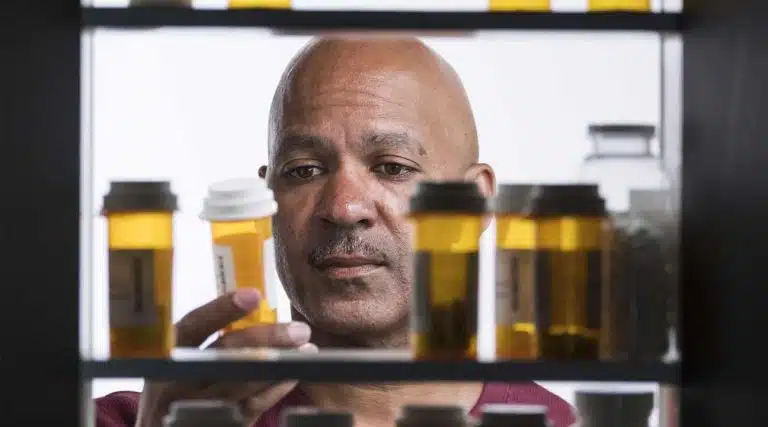Is Xanax An Opioid?
- Is Xanax A Benzodiazepine?
- Is Xanax A Barbiturate?
- Is Xanax An MAOI?
- Is Xanax A Depressant?
- Is Xanax An Opioid Or Narcotic?

Opioids and benzodiazepines are two of the most dangerous prescription drugs. They are both central nervous system (CNS) depressants and can lead to a fatal overdose if combined. One of the most commonly prescribed benzodiazepines is Xanax, also known as alprazolam.
While benzodiazepines and opioids are both addictive substances, Xanax is not an opioid. Opioids are used to treat moderate to severe pain, while benzodiazepines are used to treat anxiety disorders and panic disorders.
Is Xanax A Benzodiazepine?
Benzodiazepines (benzos) are a class of medications that increase the effect of the neurotransmitter gamma-aminobutyric acid (GABA) in the brain. This results in reduced anxiety, sedation, and relaxation.
Benzo medications include:
- Xanax (alprazolam)
- Valium (diazepam)
- Klonopin (clonazepam)
Effects Of Xanax
Alprazolam is used to treat anxiety disorders, panic disorders, and symptoms of panic attacks. Although it is an effective short-term treatment, you may still experience side effects with this medication.
Side effects of Xanax may include:
- sedation
- headache
- drowsiness
- lightheadedness
Is Xanax A Barbiturate?
Benzodiazepines were initially created to replace barbiturates but some are still used today. Barbiturates are used for the short-term treatment of insomnia or anxiety. They are CNS depressants that affect the neurotransmitter GABA, similar to alprazolam.
Although they are similar drugs, Xanax is not barbiturate. Even though benzos are addictive, they are less potent than barbiturates.
Is Xanax An MAOI?
Monoamine oxidase inhibitors (MAOI) were the first antidepressant medications created. They are not as commonly used today but they are still effective medications. Xanax is not an antidepressant medication and is not in the class of MAOI drugs.
MAOIs include:
- Marplan
- Nardil
- Emsam
- Parnate
MAOIs and other antidepressant medications cause changes in brain chemistry to improve depression. MAOIs may have severe side effects and are only prescribed if other antidepressant medications have failed.
Is Xanax A Depressant?
Depressant medications cause drowsiness, decrease anxiety, relieve muscle spasms, and prevent seizures. Xanax and other benzodiazepines are considered depressant medications.
Other depressant drugs include:
- barbiturates
- opioids
- alcohol
- hypnotic sleep-aids
Depressant drugs should never be combined because of their effect on the central nervous system. The Food and Drug Administration (FDA) administers a “black box” warning on each prescription about opioids and benzodiazepines and the risk of fatal overdose.
Is Xanax An Opioid Or Narcotic?
Although benzos and narcotics are both depressants and controlled substances, Xanax is not a narcotic or opioid. Narcotics include all natural, synthetic, and semi-synthetic opioid drugs. Narcotics include prescriptions opioids used to treat chronic pain and illicit drugs like heroin.
Narcotic drugs include:
- Oxycontin (oxycodone)
- Vicodin (hydrocodone/acetaminophen)
- fentanyl
- morphine
How Do Opioids Work?
Opioids relieve pain by binding to opioid receptors in your CNS. After binding to receptors, opioids flood the brain with dopamine. This can result in intense feelings of euphoria, which contributes to the abuse of opioids.
Opioid Overdose
One of the risks of drug abuse is a life-threatening overdose because of respiratory depression. Individuals who take high doses of opioids or take other depressant medications are at a high risk for overdose.
Signs of opioid overdose include:
- slow or labored breathing
- unresponsiveness
- vomiting
- gurgling sounds
- slow heart rate
If you or a loved one is showing signs of an overdose, seek medical attention immediately. Narcan (naloxone) can also be used to reverse the effects of opioids but you still need to seek emergency care.
Xanax Withdrawal
Alprazolam is a schedule IV controlled substance in the United States and long-term use can lead to physical dependency. Abruptly stopping the medication can lead to withdrawal syndrome.
Withdrawal symptoms may include:
- seizures
- headache
- blurred vision
- insomnia
- irritability
- muscle twitching
Medical detox or your prescribing doctor can help you safely taper off alprazolam to lessen the risk of severe withdrawal.
Addiction Treatment
Both benzodiazepine and opioid addiction can be effectively treated with long-term programs. There are many options available that can help you learn to live without drugs and improve your mental health.
Rehab and residential programs are inpatient centers that provide highly structured care. You will be provided with behavioral therapy, which will help you learn healthy coping skills before transitioning home.
If you or a loved one is seeking treatment, please contact Ark Behavioral Health today.
Written by Ark Behavioral Health Editorial Team
©2024 Ark National Holdings, LLC. | All Rights Reserved.
This page does not provide medical advice.
Drug Enforcement Administration (DEA) - Narcotics (Opioids)
Drug Enforcement Administration (DEA) - Benzodiazepines and Opioids
Mayo Clinic - Monoamine Oxidase Inhibitors (MAOIs)
National Library of Medicine: MedlinePlus - Alprazolam

Questions About Treatment?
Ark Behavioral Health offers 100% confidential substance abuse assessment and treatment placement tailored to your individual needs. Achieve long-term recovery.
100% confidential. We respect your privacy.
Prefer Texting?
Our friendly support team is here to chat 24/7. Opt out any time.







 Learn More
Learn More








